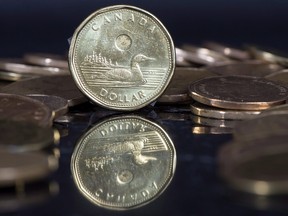
The impact of the Trudeau effect on the Canadian dollar starts to fade away with increasing awareness of its true value
Any Trudeau Effect on Canadian Dollar Wears Off as Reality Sets In
In recent days, the Canadian dollar has been impacted by various market forces, with some analysts attributing its rise to Prime Minister Justin Trudeau’s decision to step down. However, experts are now cautioning that any short-term effects may be fleeting, as broader systemic headwinds continue to weigh on the currency.
A Glimpse of Reality
On Monday, the Canadian dollar rose 0.79 per cent from its Friday close, briefly pushing above the 70-cent-U.S. mark for the first time since December 16th, when Chrystia Freeland announced her resignation as finance minister. However, this gain was largely short-lived, and by Tuesday, the loonie had slipped back to 69.7 cents U.S.
Experts Weigh In
Karl Schamotta, chief market strategist at Corpay Currency Research, notes that while Trudeau’s decision may have had some impact on the currency, it is unlikely to be a significant factor in the long term. "It may be tempting to ascribe this (the loonie’s rise on Monday) to Prime Minister Justin Trudeau’s decision to step down yesterday," Schamotta said in a note. "But we think traders don’t see short-term domestic political developments changing the longer-term outlook."
Tariff Risks
The impact of any potential tariffs imposed by the Trump administration remains a significant concern for the Canadian dollar. According to CIBC Fixed Income Currency and Commodity experts, a Trump administration will roll out tariffs at a slower pace than previously expected, but this still leaves the loonie exposed.
"We expect continued volatility in USD/CAD off headline risks," the note said. "We see the tariff premium in USD/CAD building through Q1 as Trump ramps up tariff rhetoric, at the same time as Canada ramps up for a federal election, which is likely to see a flip in the governing party."
Interest Rate Cuts on the Horizon
David Rosenberg, founder of Rosenberg Research and Associates Inc., also believes that interest rate cuts from the Bank of Canada are imminent. Contracting data released Monday confirmed for him that more rate cuts are coming to counteract a slowing economy.
The S&P Global Composite Purchasing Managers’ Index for December fell below 50, indicating slumping sentiment among managers at manufacturing, construction, and services firms. This serves as a reminder that the Bank of Canada has more work to do even as the Federal Reserve moves to the sidelines (at least for now).
Consequences of Rate Cuts
More rate cuts from the Bank of Canada will result in the Canadian dollar falling further against its American counterpart as investors chase higher returns from the greenback. This trend is likely to continue, with many experts predicting that the loonie will decline further in the coming months.
In conclusion, while Trudeau’s decision may have had some short-term impact on the currency, it is unlikely to be a significant factor in the long term. Broader systemic headwinds, including potential tariffs and interest rate cuts, continue to weigh heavily on the Canadian dollar, making any recovery difficult to sustain.
Recommendations
- Keep an eye on market developments, particularly those related to the Trump administration’s tariff policies
- Be cautious of the Bank of Canada’s decision-making process regarding interest rates
- Consider diversifying your investment portfolio to minimize exposure to potential losses
By staying informed and adaptable, investors can navigate these complex market dynamics and make informed decisions about their investments.
Join the Conversation
What do you think about the impact of Justin Trudeau’s resignation on the Canadian dollar? Share your thoughts in the comments below!
Related Stories

